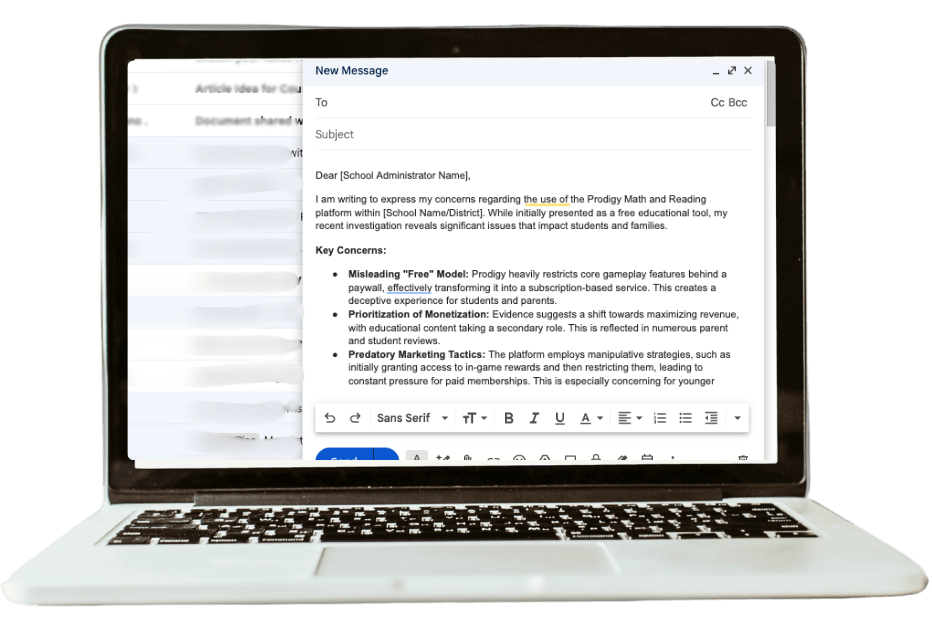How people share their family’s life online varies from person to person. I have friends whose social media feeds act as their family’s photo album—first days of school, Halloween costumes, choir concerts, and first home runs. Every extracurricular and milestone moment is documented. In contrast, I know people whose online presence is mysteriously void of the littlest people in their families.
These varying philosophies on “sharenting” can be partially attributed to the personality differences of the parents posting. But could there also be deeper, more critical reasons why people choose to keep their kids’ childhoods private?
In this article, we’ll explore the pros and cons of sharing your child’s likeness online as well as how to share information about them ethically and safely.
To post or not to post images of your children online? That is the question.
You may think the question of whether to post content of your kids online only pertains to people with large platforms. We’ve all seen actors who intentionally blur their child’s face on social media. Or the child’s head always seems to be buried in their parent’s shoulder while the paparazzi does what the paparazzi does.
For a famous person, it makes obvious sense. The parents know what it feels like to be bombarded with constant media scrutiny. They may have chosen a path of fame; that doesn’t mean their children have to follow suit.
But in the age of the internet, even ordinary people can become influencers with sizable online platforms. And while many may think they are innocently sharing their family’s life online, many are reconsidering. Here’s why:
Reasons not to post your kid’s face, name, or likeness online
1. Safety
With AI constantly evolving, several experts are sounding the alarm about the dangers it poses to our children’s online safety.
One viral commercial exposes the dangers of posting images and content of our children online throughout their childhood. Titled “A Message from Ella | Without Consent,” the commercial begins by highlighting the statistic that 75% of parents share their kids’ data on social media. Furthermore, 8 out of 10 parents have social media followers whom they’ve never met.
The video then showcases all of the content one fictional mom and dad shared of their daughter throughout her childhood, a highlight reel including birthdays, funny moments, and family memories. It ends on an AI-generated adult version of the daughter warning her parents with an ominous message: these pictures “can be taken and used…by everybody.”
The video with almost three million views puts a spotlight on some of the potential dangers: identity theft, the person’s likeness becoming part of a fake scam, bullying, or even twisting an innocent photo into child pornography.
So, how much of these supposed dangers are legitimate versus fear-mongering? It’s probably a mixture of both. Sure, posting your child’s likeness on your social media feeds may not result in anything bad. For the past quarter-century, millions of people have been posting content featuring their children. Not every child is harmed in the process.
However, AI is constantly complicating things and blurring the lines between reality and fabrication. Furthermore, the sophistication of online scammers is on the rise. In my research, it takes just one photo and a little reverse image searching to begin the process of identity theft.
2. Privacy
I can still remember my childhood days when President Bill Clinton’s daughter, Chelsea’s awkward teen years were under public scrutiny. Every time she got a pimple, it seemed to be in the headlines. And not because her parents didn’t desire otherwise.
Our kids will likely never know the privilege and agony of being the country’s first daughter. Still, we can resonate with wanting our kids to have a sense of autonomy in the public eye. Shouldn’t our children have the opportunity to choose what their digital footprint will look like when they are old enough to make their own healthy and informed decisions?
Jenna Kutcher, influencer and host of The Goal Digger Podcast, recently made the switch to keeping her kids’ faces offline. She depicts her experience of protecting her kids’ real-life moments as “sacred.”
“The sense of relief I’ve gotten from living life with them offline has been indescribably peaceful!” Kutcher says, “For me, the value of motherhood lies in the memories we create, rather than the need to prove to everyone on the internet that I’m a ‘good mom.’”
The influencer mom continues, “I love my kids, and the decision to hide their identities is not a reflection of a lack of love or pride in them, but rather a conscious choice to prioritize their well-being.”
3. Protection of Reputation
My kids informed me just yesterday of Snapchat’s newest feature called AI Imagine. A user can take two separate photos of people and “doctor” their likenesses to appear as if they are interacting in the same photo.
For example, a user can snap a photo of a friend looking directly into their camera. They can then do the same thing with another friend. Finally, they can ask Snapchat to make them appear to be high-fiving, hugging, or even kissing.
*Apparently, Snapchat’s commitment to prohibit sexually explicit material will not allow AI Imagine to go any further than the kind of “mingling” described above.
My own 15-year-old son prefers that I refrain from posting his image online, especially without asking. When I asked him to expand on his stance for the sake of this article, he mentioned not wanting his friends to come across the photos. When it comes to privacy and protection, my son values being able to control his own online presence and approve what makes its way onto the World Wide Web.
Alternatives to sharing your kids’ faces online
If all this causes you to rethink your own personal rules about posting your kids online, here are some alternatives that may help:
- If your motivation to post about your kids is to express your pride in them or to keep your loved ones updated on their milestones, consider sharing their chubby-cheeked smiles in a family or close friend group chat where the users all personally know and love your children. Additionally, telling your child face-to-face how proud you are of them, writing them a note, or bragging on them to a family member in real life can increase impact.
- If you’re motivation is having a central spot to document your memories, consider compiling your photos into a yearly photo album like Mixbook offers.
Reasons to include your kids in your posts
One reason to post about your kids online is to remain authentic to yourself. If you are a parent, your kids are an important part of your life. If you are someone who enjoys posting online, you likely want to be able to post about what is happening in your real life, which inevitably includes your kids.
Additionally, if you have a personal brand, including personal touches, like the story or face behind the brand, is advisable. Your target audience is more likely to listen if they see you as a regular human being who shares their struggles and problems. Your message gains power when those you’re influencing see you not only as worthy of emulation but also as relatable.
At the end of the day, there are different paths forward for different people and platforms. As parents, we must weigh the costs and benefits of sharing our kids’ faces (and other information) with the online world. Then, we can proceed with both caution and confidence that we are making the best decision for our families.
How to include your kids in your online presence ethically
When it comes to ethically posting your kids on social media, age and developmental stage matter. One philosophy is to wait to include your children in posts until they are old enough to make an informed decision about their own online presence. Along the way, include age-appropriate conversation to help your child understand all the nuances of their online presence.
In unique circumstances, consider a degree of separation in your online connection to your child. One of my friends who is a high school counselor, for example, temporarily changed her Facebook profile to exclude her last name. That way, when her son was entering the high school where she worked, friends and classmates would be less likely to find embarrassing photos of him from when he was a toddler. Since not all kids have parents who work at their school, she respectfully took proactive steps, recognizing the unique challenges it could create for her son.
Finally, take precautions when posting about your children online:
- Leave out identifying information, like birth dates. If you want to highlight their birthday, choose a random day of that week and consider leaving out their age.
- Ensure pictures exclude information that could identify where you live, like a photo taken on the porch where the numbers of your address (or of your neighbors’) are showing in the background.
- If you or your child is wearing a T-shirt that shows the name or likeness of their school, blur it out before posting.
- Watch what hashtags and keywords you include. Creepers and scammers seek out specific hashtags to find their next victims. For example, when influencers use the hashtag “giveaway” for a legitimate prize package, it often attracts thousands of unwanted bots and scammers.
So, how do we move forward?
So, what’s the right answer? Should we abandon the internet altogether, considering it too risky? Alternatively, should we turn a blind eye and keep sharing our lives online?
In all honesty, researching and writing this article had me anxious for a few nights while lying in bed. At the same time, I haven’t pulled the plug on all forms of online engagement. As parents, we must stay informed, understand the risks, and develop standards based on our convictions. It would be foolish to do nothing. On the other hand, we aren’t meant to live our lives in fear.
Each person must decide, based on their unique circumstances, what is right for their children and family. Ask yourself:
- Is my account public or private? Those with public accounts need to take higher precautions, though neither are completely exempt from risks.
- What kind of content do I post about? If it is of a controversial nature, it might be best to leave your kids out of the heat.
- How old are my kids? Different ages pose different risks.
In all these considerations, Kutcher emphasizes “the balance between sharing [your family life] as an aspect of [your] brand and respecting [your] children’s identities and privacy.” Finding this balance takes conversation and educating yourself.
If you have concerns about making changes to your posting habits, Kutcher advocates for experimenting. If you aren’t sure you or your audience will love adjusting to a feed without constant posts of your kids, try pivoting for a set amount of time, and see how you feel about the changes. “An experiment simply yields results that give you information to make informed decisions,” says Kutcher.

Written by: Jenna Kruse
As a speaker, writer, and mom of three, Jenna Kruse helps parents with school-aged kids overcome the frustration, fatigue, and hopelessness of parenting in the digital age so they can enjoy their kids and thrive in their role of raising the next generation to know and love Jesus. Alongside her husband, Jenna has worked with teens for over twenty years in the public school setting, the non-profit sector, and the church.




